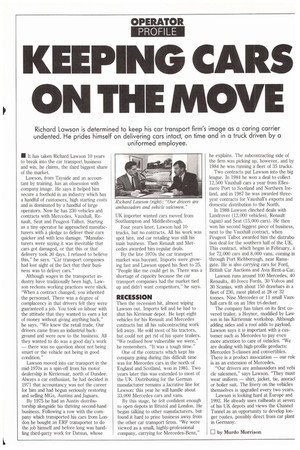EE PING CARS ON THE MOVE
Page 54

If you've noticed an error in this article please click here to report it so we can fix it.
• It has taken Richard Lawson 10 years to break into the car transport business and win, he claims, the third biggest share of the market.
Lawson, from Tayside and an accountant by training, has an obsession with company image. He says it helped him secure a foothold in an industry which has a handful of customers, high starting costs and is dominated by a handful of large operators. Now he has 230 vehicles and contracts with Mercedes, Vauxhall, Renault, Seat and Peugeot-Talbot. Starting as a tiny operator he approached manufacturers with a pledge to deliver their cars quicker and with less damage. "Manufacturers were saying it was inevitable that cars got damaged, or that this or that delivery took 30 days. I refused to believe this," he says. "Car transport companies had lost sight of the fact that their business was to deliver cars."
Although wages in the transporter industry have traditionally been high, Lawson reckons working practices were slack. "When a contract changed, you inherited the personnel. There was a degree of complacency in that drivers felt they were guaranteed a job. You took on labour with the attitude that they wanted to earn a lot of money without giving anything back," he says. "We knew the retail trade. Our drivers came from an industrial background and were new to the business. All they wanted to do was a good day's work — there was no question about not being smart or the vehicle not being in good condition."
Lawson moved into car transport in the mid-1970s as a spin-off from his motor dealership in Kirriemuir, north of Dundee. Always a car enthusiast, he had decided in 1971 that accountancy was not the career for him and had begun seriously restoring and selling MGs, Austins and Jaguars.
By 1975 he had an Austin distributorship alongside his thriving second-hand business. Following a row with the company which transported his cars from London he bought an ERF transporter to do the job himself and before long was handling third-party work for Datsun, whose
UK importer wanted cars moved from Southampton and Middlesbrough.
Four years later, Lawson had 10 trucks, but no contracts. All his work was spot hire, and car retailing was still his main business. Then Renault and Mercedes awarded him regular deals.
By the late 1970s the car transport market was buoyant. Imports were growing fast and Lawson upped his fleet to 25. "People like me could get in. There was a shortage of capacity because the car transport companies had the market tied up and didn't want competitors," he says.
RECESSION
Then the recession hit, almost wiping Lawson out. Imports fell and he had to shut his Kirrimuir depot. He kept eight vehicles for his Renault and Mercedes contracts but all his subcontracting work fell away. He sold most of his tractors, but could not get rid of his spare trailers. "We realised how vulnerable we were," he remembers. "It was a tough time."
One of the contracts which kept his company going during this difficult time was for Mercedes cars in the north of England and Scotland, won in 1981. Two years later this was extended to most of the UK. Distributing for the German manufacturer remains a lucrative line for Lawson: this year he will handle about 33,000 Mercedes cars and vans.
By this stage, he felt confident enough to open depots in Bristol and London. He began talking to other manufacturers, but found it hard to prise business away from the other car transport firms. "We were viewed as a small, highly-professional company, carrying for Mercedes-Benz," he explains. The subcontracting side of the firm was picking up, however, and by 1984 he was running a fleet of 35 trucks.
Two contracts put Lawson into the big league. In 1984 he won a deal to collect 12,500 Vauxhall cars a year from Ellesmere Port to Scotland and Northern Ireland, and in 1987 he was awarded threeyear contracts for Vauxhall's exports and domestic distribution to the North.
In 1988 Lawson clinched deals with Landrover (12,000 vehicles), Renault (again) and Seat (15,000 cars). He then won his second biggest piece of business, next to the Vauxhall contract, when Peugeot Talbot awarded him the distrubution deal for the southern half of the UK. This contract, which began in February, for 72,000 cars and 8,000 vans, coming in through Port Richborough, near Ramsgate. He is also carrying cars for Ford, British Car Auctions and Avis Rent-a-Car.
Lawson runs around 100 Mercedes, 40 Renaults, 40 Iveco Fords, 30 Volvos and 30 Scanias, with about 150 drawbars in a fleet of 230, most plated at 28 or 32 tonnes. Nine Mercedes or 11 small Vaux• hall cars fit on an 18m tri-decker.
The company has taken on its first covered trailer, a Hoynor, modified by Lawson in his Kirriemuir workshop. Although adding sides and a roof adds to payload, Lawson says it is important with a customer such as Mercedes to pay even more attention to care of vehicles. "We are dealing with high-profile products; Mercedes S-classes and convertibles. There is a product association — our rolc is as an extension of Mercedes.
"Our drivers are ambassadors and vehi cle salesmen," says Lawson. "They must wear uniform — shirt, jacket, tie, anoracl or boiler suit. The livery on the vehicles themselves is upgraded every two years.
Lawson is looking hard at Europe and 1992. He already uses railheads at seven of his UK depots and views the Channel Tunnel as an opportunity to develop longer routes, possibly direct from car plant in Germany.














































































































































































